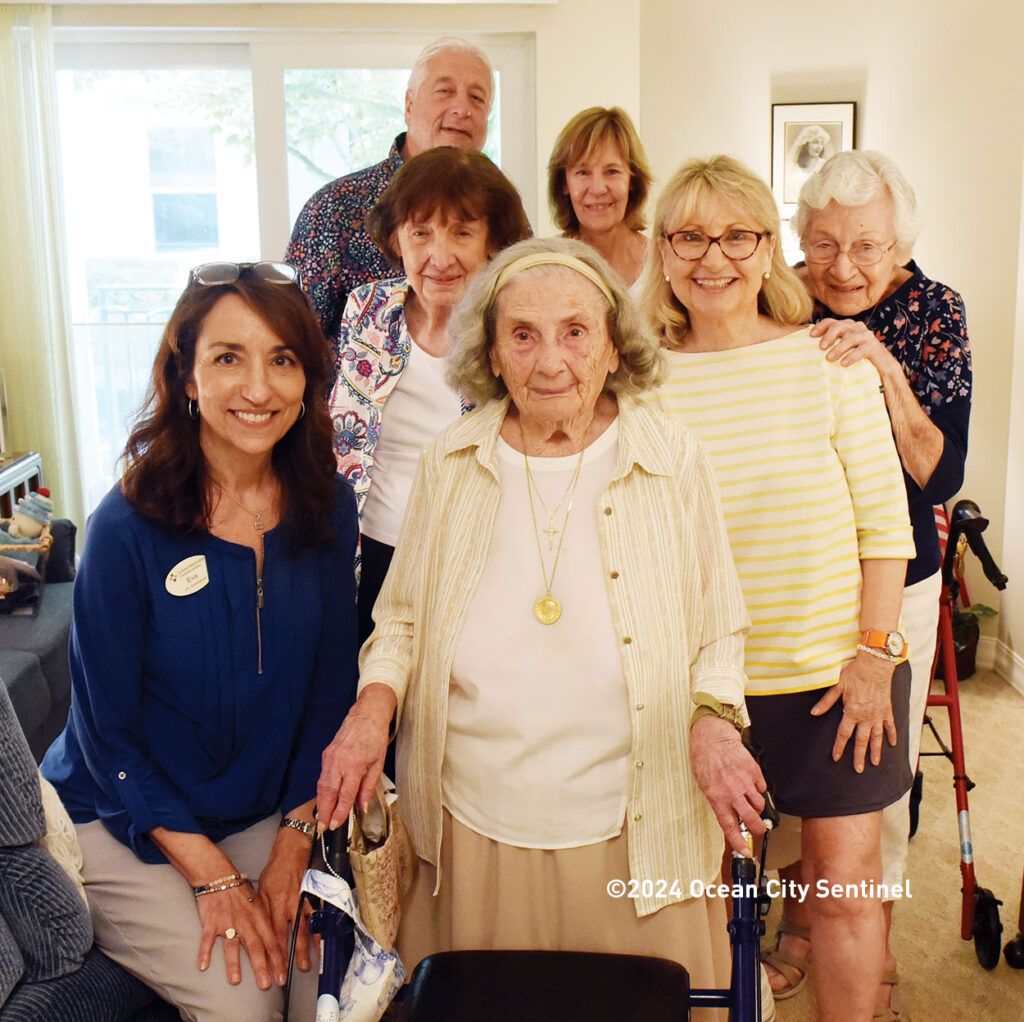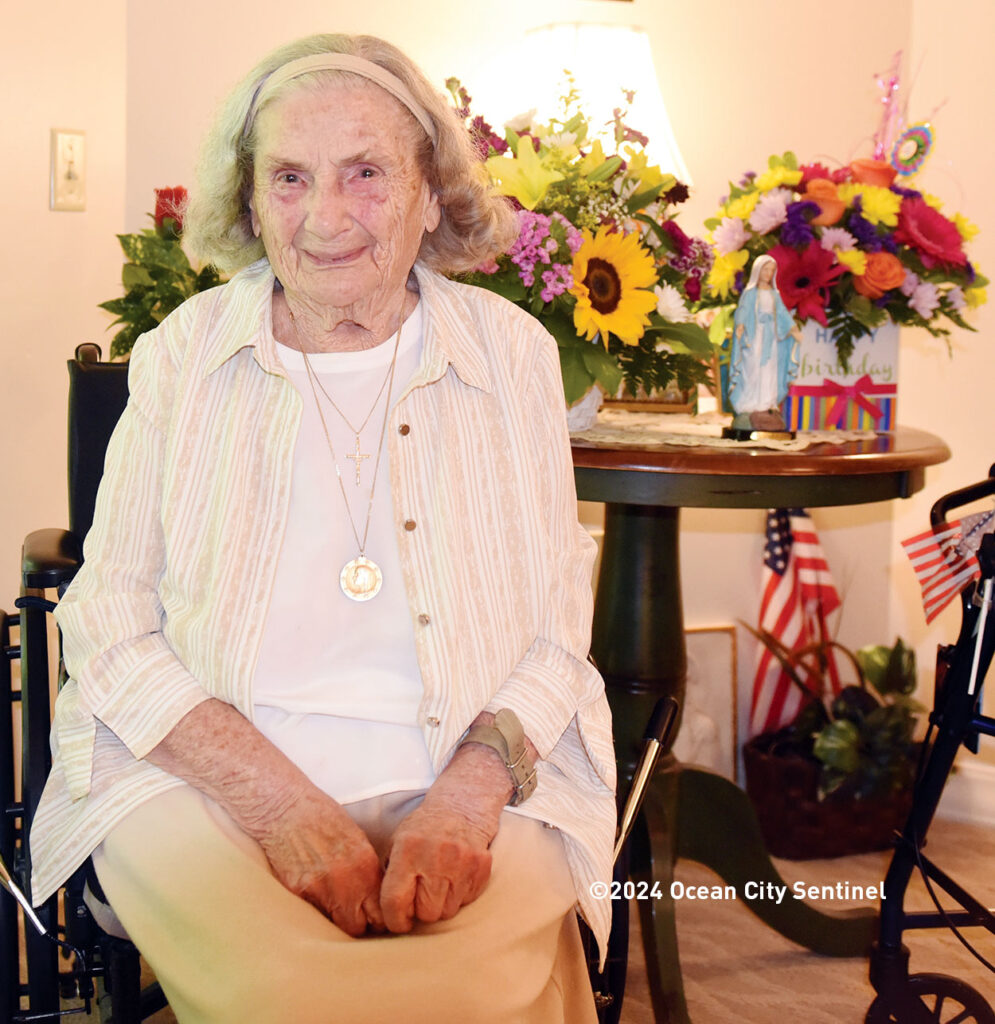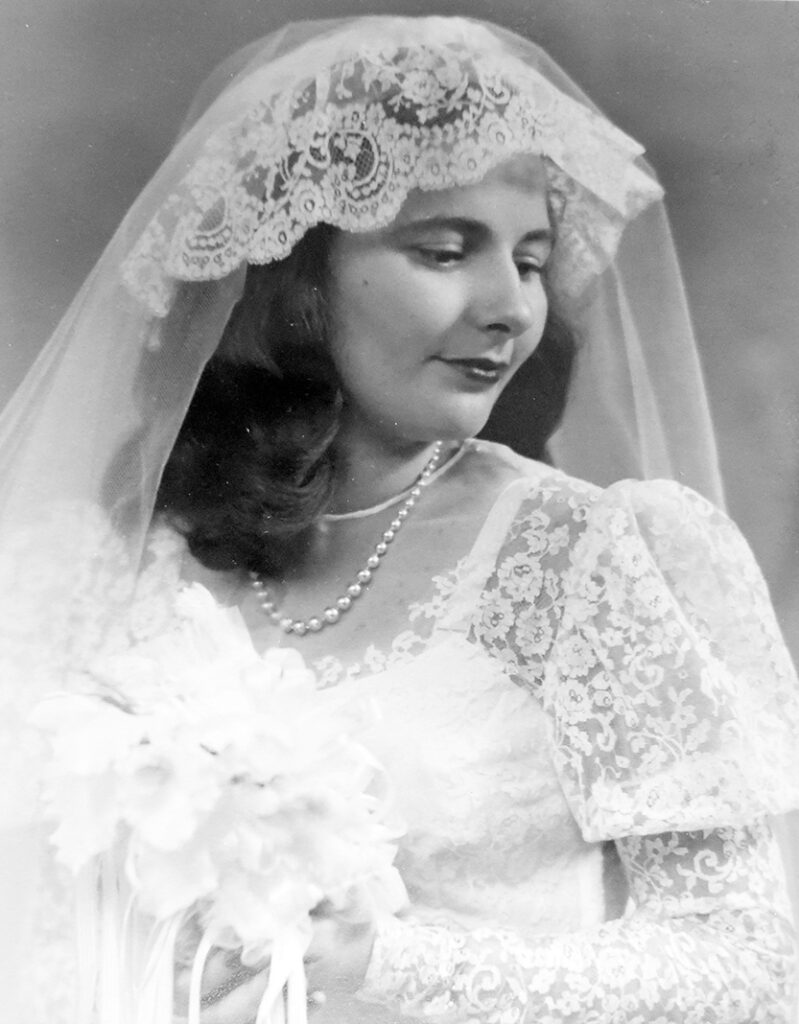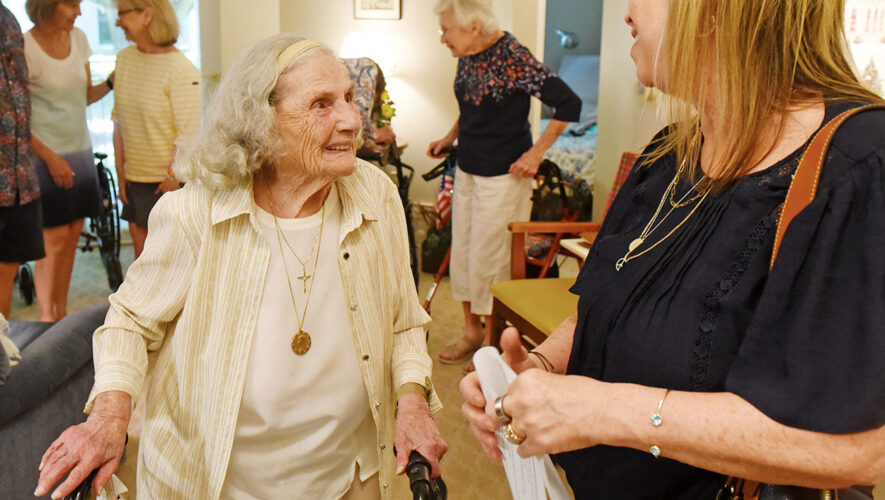Centenarian hasn’t dimmed her sense of humor, faith or toughness
OCEAN CITY — Whether you’re walking the mean streets of South Philadelphia or the sedate halls of The Shores, better keep an eye out for Marie Sesso. She turned 100 years old June 13, 2024, but she’s still quite the pistol.
This self-professed “street smart” South Philly gal was full of laughter and quips when celebrating her birthday last week at The Shores, the UMC Community on Bay Avenue that has been her home for the past five years.
Interviewing her was an exercise in trading light-hearted fire with Sesso, a diminutive lady with a personality larger than a Philadelphia Eagles linebacker.
Because a representative from Mayor Jay Gillian’s office was expected at her birthday celebration, she asked if I were that person. When I identified myself, she feigned mock horror.
“You’re the newspaper guy? Oh, my gosh.” I let her know that everything she said could and would be used against her.
“God help me,” she laughed. “What do you want me to say?”
Getting her talking didn’t take much prodding.

Sesso lived in one house for the first 95 years of her life at 728 Clymer St. Her daughter, Donna DiPasquale, said her mother was born on the kitchen floor and wasn’t expected to live through the day. Her neighbors gathered and prayed. It was the feast day of St. Anthony.
Sesso’s mother was born in Italy and her father was a first-generation American.
“He was Irish,” she said of her dad. Laughing, she added, “My name was Marie Carroll before I married my husband. So I’m a mixed mongrel.”
She was born five years before the start of the Great Depression, and described growing up in glowing terms.
“We were happy as a lark. We had nothing but we had everything. We made paper dolls, played Ring Around the Rosie, jacks and red light — you run up the street and when they say ‘red light,’ you stop.
“We didn’t ask for electronics like they do today and we didn’t need them,” she said. “We had a lot of fun. Boys would stand on the corner singing away, waiting for us to get off the trolley car to keep us girls safe.”
“I raised my kids in South Philadelphia,” she said. “My kids were born there and they stayed until they got married.”

“I didn’t even drive because we walked everywhere — Strawbridge’s, Wanamaker’s, Lit Brothers. And I was near the open (Italian) Market on Ninth Street and Frank Palumbo’s,” she said. (Palumbo’s was a famous entertainment complex in South Philadelphia.)
“I didn’t need a car and I didn’t need to move out because I had everything available to me,” she said.
Her daughter taught at Merion Mercy High School and Wildwood Catholic High School. Her son, Dr. Arthur Sesso, is a professor and surgeon with a long career at Philadelphia College of Osteopathic Medicine, most recently as surgical residency director and academic dean. He retired a year ago but still works in administration at the medical school.
Pointing to pictures of herself and her girlfriends, Sesso explained when Pennsylvania Hospital had its annual fair, they would set up tables — Irish tables, Italian tables — in the park across the street and they would dress up in Betsy Ross hats.
“For years mom did charitable work for anybody in Philadelphia that needed it,” DiPasquale said. “This (photo) was from Pennsylvania Hospital, which was close to the home. They would get out, bake and cook, whatever booth they had, and sell. And they did it in Colonial gear.
“They started during World War II and continued from there because most of the women were doors away from each other on these tiny little streets,” DiPasquale said. “They were constantly in each other’s lives. When there was a need, something came up, they would get together and fill the need.
“There was always some charitable work going on,” her daughter said. Her mother, she added, was “always in the middle of everything.”
“That’s what they tell me,” Sesso interjected. “They tell me I lifted up the place when I came here,” she said of The Shores, laughing again.
“I got it alive. They don’t know what hit it when I got here.”

She married her husband, Nevio Sesso, in 1948. He flew bombers during World War II. “After that he was a gemologist. He would fix watches when watches got parts to it,” she said. “He made them. In my day, like I said, we had nothing but we had everything. Not today. I’m not leaving a good world today.”
She joked about why she wasn’t already up in heaven with her late husband.
“My kids say I’m still here ’cause daddy don’t want you. He said, ‘Stay there! Stay there!’ That’s what they tell me. Daddy doesn’t want you. Stay there.” Then she laughed heartily.
“My kids say I never stop calling, ‘Nev, Nev. Do this. Do that.’ He was a wonderful man. They don’t make them like that any more,” she said. And then looking at the reporter and laughing again, she added, “I don’t know about you.
“You ever get a hundred-year-old lady who talks like this?” When told no, it brought another peal of laughter.
Turning serious about her long life, she said, “It’s up to God, what God wants. God be the glory. That’s what I figure. Without the Blessed Mother and God, I wouldn’t be here.”
And then she pointed to a black and white photograph of herself on the wall.
“That’s my wedding picture up there. My mother made it (the gown). She was a seamstress. French lace. I still have the dress.”
Asked what was different growing up then compared to now, she said, “I think we respected our parents and we listened to them. My mother would say to me, if I wanted to go to a dance she didn’t like, she would say, ‘Better you cry than me.’ That’s good.
“We had girlfriends and made do with what we had and we were the happiest people in the world. … My mother couldn’t afford a coach for me so she got my father’s shoebox, tied a string, put the doll in it. I was the happiest kid in the world. And I dragged that (all over).”
Today, she said, “It’s a different world. We didn’t ask for things. We went through the Depression, but we never knew we were poor because everybody else was in the same boat. We were happy to get what we got.”
Sesso believes “everybody should have at least a few years in South Philadelphia. They’d become a stronger person. We learned to stand on our own two feet.”
Living there put her feet close to so many things.
“We had everything at our feet. Everything was there. Horn and Hardart was right a few blocks down. You walked to Wanamaker’s. You heard the organ. Churches were on every corner. Catholic schools were around. We weren’t afraid to walk or do anything. In the summertime people would sit outside and sleep; nothing bothered them on their beach chairs.
“We were so close in our neighborhood that when you were in trouble you banged the walls and your neighbor ran in when you got a problem,” Sesso said. “Today it’s a different thing.”
And then she started quizzing me about South Philadelphia.
When I mentioned Ralph’s Italian Restaurant, she brightened up.
“I lived a block away …. Ralph’s is on Ninth Street and Sarcone’s is right there, the baker’s shop. And you know Frank Palumbo’s and Nostalgia’s (Restaurant). I was always there. Frank Palumbo’s used to have two-dollar nights for supper or whatever. Isgro’s, the baker.”
When I identified their locations, Sesso nodded approvingly.
“So he knows the neighborhood,” she said to her daughter.
“I did enough talking,” she suddenly declared, but then she talked some more.
“My children live (locally) now. My daughter was going to put me up in her place … but something happened.” Just as her daughter was starting to explain what that was, Marie quickly added, “I didn’t want to go.”
Then, learning forward and whispering to me, she said, “I wanted to give them their independence. I put the money here and figured they got their independence. You know what I mean? Cut the cord.”
“I was on Medicare before she cut the cord,” her daughter said, laughing.
Sesso likes living at The Shores.
“I enjoy that my kids don’t have to worry about me, that I’m being taken care of, but I miss cooking. I used to cook every day. In my day we didn’t have a refrigerator. We didn’t have anything. We had to cook every day, no leftovers. The first thing we had was a box in our window in the winter and then came the ice man.
“I’d rather have the fresh food than the frozen food they have today with the preservatives,” she said. “That’s what kept me alive. The fresh food.”
A positive attitude (perhaps more emphasis on the attitude) has kept her around for more than a century.
“My dad used to say when you have a problem you could either cry or sing, so sing. He was the Irishman,” she said, laughing.
Looking serious, she cited the reason for her longevity.
“With a song in my heart and a prayer on my lips, God be the glory.”
And then, smiling again, “Have you had enough of South Philadelphia?”
With the interview over, and still waiting for the mayor or his representative, she smiled and said whoever arrived should be prepared.
“He’s going to find a South Philadelphia girl. He’s not going to find a dead 100-year-old lady.”
– STORY and PHOTOS by DAVID NAHAN/Sentinel staff


